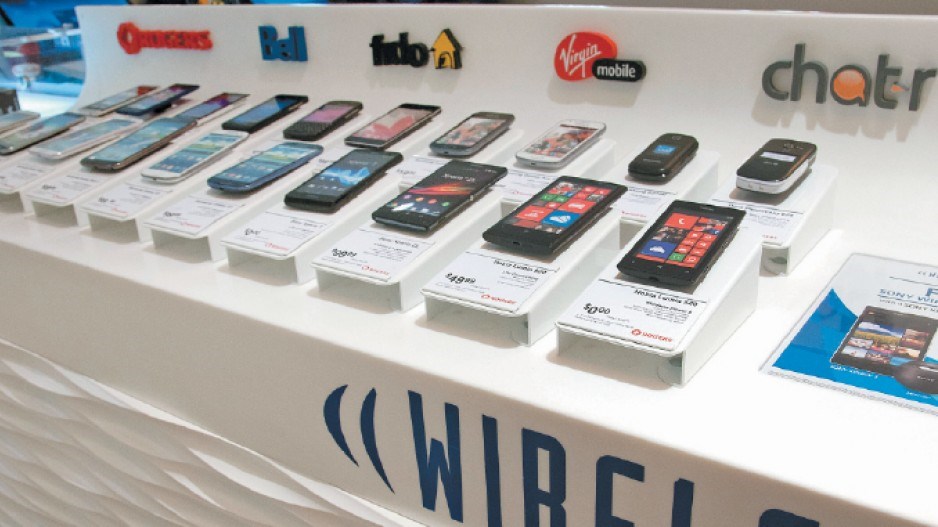Ottawa stands to make about $800 million less from the sale of wireless spectrum than it might have generated had some large player like Verizon Communications Inc. (NYSE:VZ) or AT&T (NYSE:T) entered the Canadian wireless market, according to a recent Scotiabank Capital Inc. analysis.
Industry Canada released a list on September 23 of the 15 companies placing initial bids on wireless spectrum in an upcoming January auction, and conspicuously absent was any large foreign player – despite fears raised by Canadian telecoms that that might happen.
Canada's Big Three telecoms, Telus (TSX:T), Rogers Communications Inc. (TSX:RCI) and BCE Inc. (TSX:BCE), have placed initial bids, as expected, as have regional players like Saskatchewan Telecommunications and Manitoba's MTS Inc.
Globalive Wireless Management Corp, which owns Wind Mobile, has also entered a bid, as has Feenix Wireless, whose president and CEO is listed as John Bitove, executive chairman of the financially troubled Mobilicity.
Two smaller British Columbia companies have also entered the bidding race: Vecima Networks Inc. (TSX:VCM) and Novus Wireless Inc.
The absence of any large foreign player in the auction might be bad news for the federal government, but good news for Canadian telecoms, like Telus which, according to Scotiabank Capital analyst Jeff Fan, could end up buying spectrum for about half of what it might have had to pay were it bidding against some major foreign player.
"Without a deep-pocket strategic bidder … we believe the competitive intensity will be lower than we originally anticipated," Fan wrote in a recent brief.
Fan estimates Telus might have spent $650 million to acquire spectrum had it been bidding against a player like Verizon. He now estimates the company might spend only $330 million. Other companies would also make lower bids than they would have if a Verizon had joined in the bidding, he wrote.
Ottawa raised more than $4 billion in the 2008 spectrum auction. But as Fan points out, there was more for sale, and the way set-asides for new entrants was structured affected how the auction played out.
In January, the federal government will auction off seven blocks of spectrum in the 700 megahertz range.
Four of those blocks are considered prime because they have the same frequencies used by AT&T and Verizon, and there are economies of scale for Canadian carriers that can use the same frequency.
It's those blocks Canada's Big Three telecoms are expected to bid on, though no one will know for certain until after the auction, because Industry Canada has forbidden companies bidding in the auction to discuss their plans.
The three blocks of spectrum that are not considered prime can be used for purposes other than cellphones, which might explain why Vecima and Novus are bidding. Vecima has bought spectrum before. In July, the company sold $14 million worth, and it still owns radio spectrum in the 24 and 38 GHz range.
The Victoria-based company makes and sells "last mile" hardware used to deliver broadband Internet and cable television. Wireless signals are sometimes used instead of fixed wire links to deliver signals.
Meanwhile, Novus provides Internet, phone and cable TV in Vancouver, Burnaby, Richmond and Surrey. It has carved out a niche by providing high-speed fibre to buildings in Vancouver. Novus bought spectrum in the 2008 auction but later sold it to Telus.
Spectrum can also be used to transmit signals between hardware instead of using fixed wires, said Chris Allen, president of ABC Communications and director for the BC Broadband Association.
For example, he said spectrum could be used to link one building that is wired with fibre optics to one that isn't, thereby providing high-speed Internet without having to install fibre in the other building.
However, he added that those kinds of wireless links can be accomplished with other bands of spectrum – it doesn't require the premium and pricey 700 MHz band. The 700 MHz spectrum has been called the beachfront property of wireless real estate. It travels farther than other bands (which means fewer cell towers are needed) and has better penetration. It is therefore valuable as a commodity in itself.
"If you've got the capital for it," said Allen, "you wouldn't even have to be in IT to be interested in spectrum because it's like real estate – it only goes up in value." •




